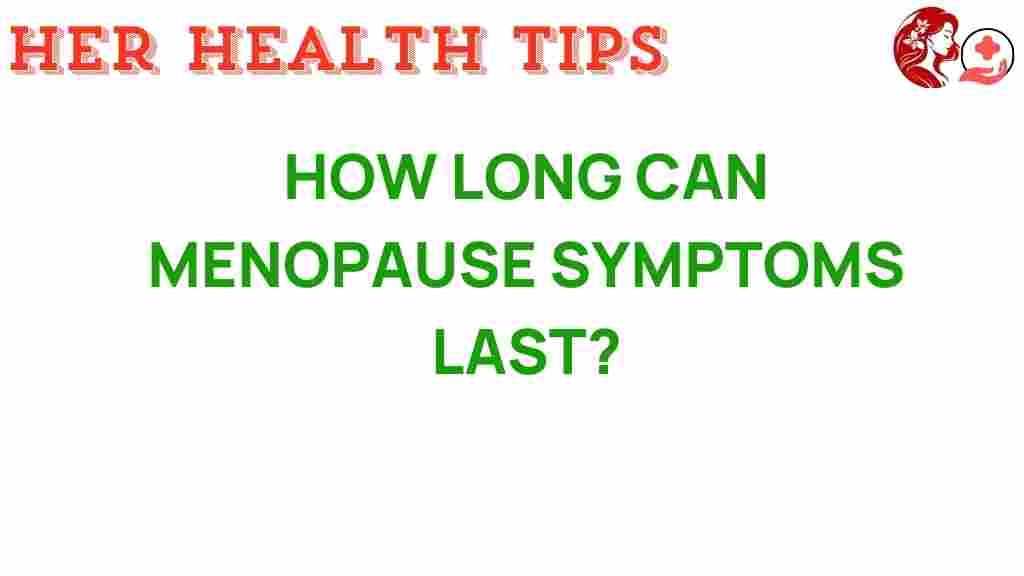The Duration Dilemma: How Long Do Menopause Symptoms Last?
Menopause is a significant phase in every woman’s life, marking the end of her reproductive years. During this midlife transition, women experience a variety of hormonal changes that can lead to a range of menopause symptoms. Understanding how long these symptoms last is crucial for managing health and maintaining quality of life. In this article, we will explore the duration of menopause symptoms, coping strategies, and essential health awareness for women navigating this transition.
Understanding Menopause Symptoms
Menopause symptoms are a result of hormonal changes that occur as women age. These symptoms can vary widely in type and duration. Common menopause symptoms include:
- Hot flashes
- Night sweats
- Irregular periods
- Vaginal dryness
- Sleep disturbances
- Mood swings
- Memory issues
These symptoms can significantly affect a woman’s quality of life, making it essential to understand what to expect during this time.
Duration of Menopause Symptoms
The duration of menopause symptoms varies greatly among women. Some may experience symptoms for a few months, while others may deal with them for several years. Here’s a breakdown of what to expect:
- Perimenopause: This is the transitional phase leading up to menopause, which can last anywhere from a few months to several years. Women during this phase may experience irregular periods and other symptoms.
- Menopause: Officially defined as 12 months without a menstrual period, menopause marks the end of a woman’s reproductive years. Symptoms may peak around this time.
- Postmenopause: This phase begins after menopause and can last for the rest of a woman’s life. Some symptoms may continue, but they often lessen in intensity over time.
Research indicates that most women will experience menopause symptoms for an average of four to five years, but some may face challenges for a decade or longer. Factors influencing the duration of menopause symptoms include genetics, lifestyle, and overall health.
Factors Affecting the Duration of Menopause Symptoms
Several factors can influence how long menopause symptoms last:
- Genetics: Family history can play a significant role in the onset and duration of menopause symptoms.
- Lifestyle: Factors such as diet, exercise, and smoking can impact the severity and duration of symptoms.
- Health Conditions: Existing health issues, such as thyroid disorders or autoimmune diseases, may exacerbate menopause symptoms.
Understanding these factors can help women make informed decisions about their health during this transition.
Coping Strategies for Menopause Symptoms
While menopause symptoms can be challenging, there are several effective coping strategies that can help improve quality of life:
- Healthy Diet: A balanced diet rich in fruits, vegetables, whole grains, and healthy fats can help manage symptoms. Foods high in phytoestrogens, like soy products, may also alleviate some discomfort.
- Regular Exercise: Physical activity can help reduce hot flashes, improve mood, and promote better sleep. Aim for at least 150 minutes of moderate aerobic exercise each week.
- Stress Management: Techniques such as yoga, meditation, and deep-breathing exercises can help manage stress levels and improve overall well-being.
- Hormone Therapy: For some women, hormone replacement therapy (HRT) can be an effective way to manage severe menopause symptoms. It’s essential to discuss this option with a healthcare provider.
- Support Groups: Connecting with other women going through similar experiences can provide emotional support and practical advice.
Implementing these strategies can empower women to take control of their health during this significant life transition.
Health Awareness and Menopause Management
Raising health awareness about menopause is critical for women’s health. Understanding the symptoms and their potential duration can help women seek appropriate care and support. Here are some key points for effective menopause management:
- Regular Check-ups: Women should have regular gynecological check-ups to monitor their health during this transition.
- Stay Informed: Educating oneself about menopause symptoms and management options is essential. Resources such as Menopause.org provide valuable information.
- Communicate with Healthcare Providers: Open communication with healthcare providers can lead to tailored treatment plans that address individual needs.
By prioritizing health awareness, women can navigate menopause more effectively and maintain a higher quality of life.
Troubleshooting Common Menopause Symptoms
Many women encounter specific challenges during menopause. Here are some common symptoms and troubleshooting tips:
- Hot Flashes: Dress in layers, keep a fan nearby, and avoid triggers like spicy foods and caffeine.
- Sleep Disturbances: Establish a regular sleep routine, limit screen time before bed, and consider relaxation techniques to improve sleep quality.
- Mood Swings: Engaging in regular physical activity and seeking counseling can help manage emotional changes.
- Vaginal Dryness: Use water-based lubricants during intercourse and consider vaginal moisturizers to alleviate discomfort.
Identifying effective solutions for these symptoms can significantly improve a woman’s experience during menopause.
Conclusion
The duration of menopause symptoms varies widely among women, influenced by genetic, lifestyle, and health factors. While the transition can be challenging, understanding the symptoms and their potential duration can empower women to seek effective coping strategies and manage their health proactively. By prioritizing health awareness and engaging in menopause management, women can navigate this midlife transition with greater ease and improve their overall quality of life.
For more in-depth information about menopause and women’s health, explore resources from trusted organizations and consider discussing your symptoms with a healthcare provider to find the best strategies for you.
This article is in the category Reproductive and created by HerHealthTips Team

2 thoughts on “The Duration Dilemma: How Long Do Menopause Symptoms Last?”